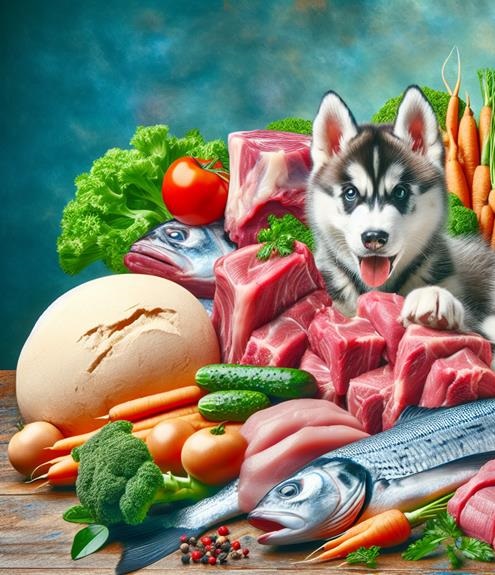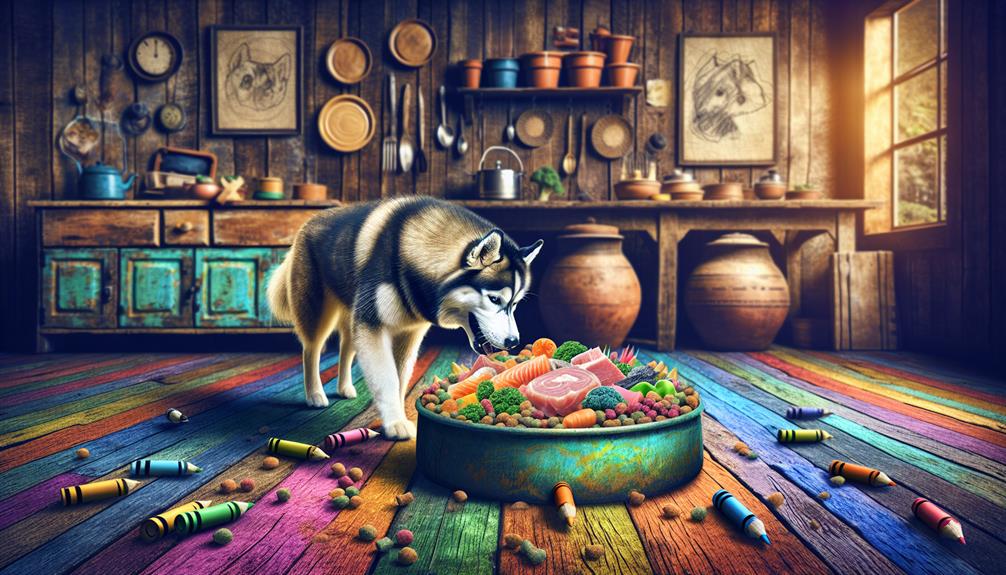Determining the ideal diet for adult Siberian Huskies involves understanding their unique nutritional needs, which are shaped by their energetic and active nature. A diet rich in high-quality proteins, healthy fats, and complex carbohydrates is crucial for maintaining their health and vigor. However, the specific sources of these nutrients, as well as the right balance and feeding schedule, can greatly impact their overall well-being. As we explore these dietary considerations further, a closer examination of recommended protein sources and the role of supplements may reveal surprising insights. Learn the essential dietary components for adult Siberian Huskies to ensure their vitality and health, and discover what surprising nutrients they truly need!
Key Takeaways
- A balanced diet rich in high-quality proteins, healthy fats, and complex carbohydrates is essential for energy and overall health in adult Huskies.
- Regular portion control and a consistent feeding schedule, ideally twice a day, help maintain an ideal body condition and prevent obesity.
- Essential nutrients, including omega fatty acids, support skin, coat health, and joint function, crucial for active adult Huskies.
- High-quality dog food, preferably breed-specific formulas, ensures that Huskies receive tailored nutrition to meet their unique dietary needs.
- Fresh water availability at all times aids in hydration and supports metabolic functions, vital for adult Huskies’ health.
Nutritional Requirements for Huskies

Siberian Huskies have specific nutritional requirements that must be met to support their high energy levels and overall health, necessitating a balanced diet rich in proteins, fats, vitamins, and minerals.
Effective huskie weight management is essential, as maintaining an appropriate body condition helps prevent health issues. Hydration importance cannot be overstated; fresh water should always be available to support metabolic functions.
Age-specific nutrition plays a key role, as puppies, adults, and seniors have differing dietary needs. Breed-specific diets are advantageous, tailored to the unique characteristics of Huskies, including their high activity levels.
Additionally, digestive health considerations must be prioritized, as Huskies can be prone to gastrointestinal sensitivities. Allergies and sensitivities may also be prevalent in this breed, necessitating careful ingredient selection.
Seasonal dietary adjustments can enhance energy levels, particularly during colder months when caloric needs may increase. Implementing portion control strategies is essential to prevent overfeeding, allowing owners to provide the right amount of food while ensuring their beloved companions remain healthy and vibrant.
Essential Nutrients for Energy
A well-balanced diet for adult Huskies must include essential nutrients that provide the necessary energy to support their active lifestyle and overall health. Energy-boosting foods, rich in complex carbohydrates and healthy fats, are critical for sustaining their endurance during physical activities. Proper meal portioning is significant, as it directly influences weight management and guarantees Huskies maintain an ideal body condition.
Hydration importance cannot be overstated; adequate water intake aids in nutrient absorption and helps regulate body temperature, especially during strenuous training sessions. Age considerations also play an important role, as older Huskies may require adjusted nutrient profiles to maintain energy without excess weight gain.
The activity level impact is significant; more active Huskies will necessitate increased caloric intake, particularly during colder seasons when energy needs may rise due to additional exertion for warmth. Furthermore, seasonal adjustments in diet can help accommodate changes in activity levels, promoting peak performance and health.
Recommended Protein Sources
Selecting high-quality protein sources is crucial for meeting the dietary needs of adult Huskies, as protein plays an important role in muscle maintenance, repair, and overall metabolic function. A balanced approach incorporating various protein sources can enhance both health and well-being in these active dogs.
Here are three recommended protein sources:
- Fish Options: Rich in omega-3 fatty acids, fish not only provides high-quality protein but also supports skin and coat health. Salmon and sardines are excellent choices, offering essential nutrients while being easily digestible.
- Poultry Choices: Chicken and turkey are popular protein sources in raw diets due to their high meat quality. They provide essential amino acids required for robust muscle development and overall health.
- Legumes Benefits: For those exploring vegetarian alternatives, legumes like lentils and chickpeas can be beneficial. They provide plant-based protein and fiber, contributing to digestive health while balancing the protein profile when combined with other food sources.
In some cases, protein supplements may be necessary to guarantee peak intake, especially in active or aging Huskies. Always consult with a veterinarian before making significant dietary changes.
Importance of Healthy Fats
In addition to high-quality protein, incorporating healthy fats into the diet of adult Huskies is essential for supporting energy levels, promoting ideal skin and coat health, and aiding in the absorption of fat-soluble vitamins. Healthy fats, particularly those rich in omega fatty acids, provide numerous benefits that are vital for the overall wellbeing of your Siberian Husky.
The following table outlines key fat sources and their associated benefits:
| Fat Source | Benefits |
|---|---|
| Fish Oil | Omega benefits, joint support |
| Flaxseed Oil | Digestion aid, immune support |
| Chicken Fat | Energy levels, coat health |
| Coconut Oil | Weight management, digestion aid |
| Sunflower Oil | Skin health, immune support |
Carbohydrates and Fiber Needs
Carbohydrates and fiber play an essential role in the diet of adult Siberian Huskies by providing essential energy and supporting healthy digestion.
These elements are vital not only for maintaining ideal energy levels but also for promoting digestive health. A well-balanced diet that includes appropriate carbohydrate sources can assist with weight management, particularly in active breeds like the Siberian Husky.
Consider the following key points regarding carbohydrates and fiber in your dog’s diet:
- Carbohydrate Sources: Opt for high-quality carbohydrates such as sweet potatoes, peas, and brown rice, or explore grain alternatives like quinoa and lentils, which can provide sustained energy.
- Fiber Benefits: Incorporating adequate fiber from vegetables and fruits aids in digestion, helping to regulate bowel movements and maintain gut health.
- Activity Requirements: Tailoring meal timing and carbohydrate intake to match your husky’s activity levels can enhance performance and recovery, ensuring they remain energetic and healthy.
Feeding Schedule Guidelines
Establishing a consistent feeding schedule is essential for maintaining the overall health and well-being of adult Siberian Huskies, particularly when considering their active lifestyle and specific dietary needs. Meal timing should ideally occur twice a day, allowing for proper digestion and energy distribution throughout their day. This feeding frequency supports portion control, which helps to prevent obesity—a common concern for this breed.
In managing hydration needs, always provide fresh water at each meal, encouraging your Husky to stay well-hydrated. During adjustment phases, when introducing new food, gradual changes over 7-10 days can help minimize gastrointestinal distress.
Proper food storage is vital; make certain that kibble is kept in a cool, dry place to maintain its nutritional quality. Additionally, behavior monitoring during feeding times can provide insights into your dog’s health and satisfaction with their diet, allowing you to make necessary adjustments.
For senior Siberian Huskies, consider slight modifications in portion sizes and feeding frequency to accommodate their changing energy levels and digestive capabilities. Attention to these guidelines fosters a strong bond between owner and pet, guaranteeing that your furry companion thrives throughout their life stages.
Choosing Quality Dog Food
Selecting high-quality dog food is crucial for meeting the specific nutritional requirements of adult Siberian Huskies, guaranteeing they receive the essential nutrients to support their active lifestyle and overall health.
When choosing dog food, consider the following factors:
- Premium Ingredients: Look for formulas that list high-quality proteins, healthy fats, and whole foods as their primary ingredients. These contribute to peak growth and energy levels.
- Grain-Free Options: Many Huskies thrive on grain-free diets that minimize the risk of allergens. Assess your dog’s tolerance and consider breed-specific formulas that cater to their unique needs.
- Wet versus Dry: Each food type has its benefits. Wet food can enhance hydration and palatability, while dry food often aids in dental health.
Additionally, practice portion control to prevent obesity, and always read labels to understand the nutritional breakdown.
Store food in a cool, dry place to maintain freshness, and be mindful of allergen considerations to guarantee your husky’s diet is both safe and beneficial.
Supplements and Treats Options
Incorporating appropriate supplements and treats into an adult Siberian Husky’s diet can enhance their overall health and support specific nutritional needs that may not be fully met by their primary food source.
Various supplement types, such as omega fatty acids, glucosamine, and probiotics, can promote joint health and improve digestion. For those who prefer natural treats, options like freeze-dried meat or fruits can provide essential vitamins while satisfying your dog’s palate.
Homemade options, including baked sweet potatoes or lean chicken, serve as nutritious training rewards, reinforcing positive behavior without excess calories. Seasonal treats can also be introduced to add variety, but care should be taken to guarantee they align with your dog’s dietary requirements.
Additionally, protein boosters like fish oil can enhance muscle development, while hydration methods, such as adding water to kibble, can guarantee ideal hydration, particularly in active dogs.
Focus on dental health with chewable treats specifically designed to reduce plaque and tartar buildup.
Finally to mention,
To summarize, an ideal diet for adult Siberian Huskies must prioritize high-quality proteins, healthy fats, and complex carbohydrates to meet their energetic needs.
Remarkably, studies indicate that proper nutrition can enhance a dog’s lifespan by up to 20%.
The inclusion of nutritious ingredients, adherence to feeding schedules, and consideration of supplements can greatly improve the overall health and well-being of this breed.
Ensuring a balanced diet is essential for maintaining ideal energy levels and preventing health issues.


